|
|
|
Sort Order |
|
|
|
Items / Page
|
|
|
|
|
|
|
| Srl | Item |
| 1 |
ID:
105354
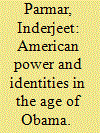

|
|
|
|
|
| Publication |
2011.
|
| Summary/Abstract |
Although the election of Barack Obama to the US presidency represents a landmark event in the history of that country, questions remain over its broader political significance. What is the likelihood of Obama's foreign and national security policies differing fundamentally from those of the Bush administrations? Does Obama's election signal a 'post-racial' phase in American national life? What are the factors that suggest opportunities to change and expand American identities as opposed to those that limit Obama's sphere of action? This article introduces the special issue and suggests that although Obama's room for manoeuvre is limited by legacies inherited from the Bush administration, Obama's own appointments to high office as well as other actions, despite the availability of alternative courses, indicate that he is not the transformational president he claimed to be. American identities, therefore, are deeply embedded and remain heavily imbued with racial, religious and imperial features.
|
|
|
|
|
|
|
|
|
|
|
|
|
|
|
|
| 2 |
ID:
105362
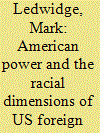

|
|
|
|
|
| Publication |
2011.
|
| Summary/Abstract |
This article consists of a critical discourse that examines the meteoric rise of Barack Obama within the context of international and domestic race relations. The article explores the impact of American racism on domestic and foreign affairs, in addition to providing contrasting viewpoints on the significance of Obama's election to the presidency. The article utilises the Obama phenomenon to assess US perceptions of the North-South divide, race, ethnicity, religion and anti-Americanism, in addition to unpacking the controversy surrounding Rev. Jeremiah Wright's characterisations of American power. The Obama campaign's post-9/11 context will be used to ascertain whether conservative efforts to associate Obama with Islam represent a conservative backlash that represents an ethnocentric re-articulation related to race, religion and the War on Terror, followed by an assessment of whether the Obama phenomenon is indicative of the perfectibility of US democracy, which would justify the exportation of American values. The article will engage in an interdisciplinary discourse grounded in political science, history and IR to provide the depth of knowledge and theoretical competency to frame the discussion in a historical and contemporary context that acknowledges Obama's relevance to domestic and international politics.
|
|
|
|
|
|
|
|
|
|
|
|
|
|
|
|
| 3 |
ID:
105372
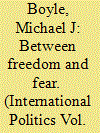

|
|
|
|
|
| Publication |
2011.
|
| Summary/Abstract |
Why have two successive US administrations concluded that fighting terrorism must involve democracy promotion? This assumption became prevalent in US political discourse following the events of September 11 despite the fact that the empirical evidence linking democracy and terrorism is weak or ambiguous. More strikingly, it has persisted even after the missions to establish democracies in Afghanistan and Iraq have led to increasing violence, including a worldwide increase in terrorist attacks. This article argues that the link between democracy and terrorism was established by the combined effect of three factors: (a) the framing of the September 11 attacks in a way that increased the receptivity to this conceptual opposition between freedom and fear; (b) the ideological influence of the Wilsonian tradition, as manifested today in an unusual consensus between modern neo-conservatives and liberal internationalists on the desirability of democratic reform as a means of changing foreign policy behaviour; and (c) a powerful bipartisan domestic constituency in favour of democracy promotion. Owing to these three factors, the contraposition of democracy and terrorism in American political discourse is effectively over-determined because it mirrors the dominant ideological and political preferences of American elites. This fixed preference for democracy promotion explains why the Obama Administration has remained wedded to the binary distinction between freedom and fear in its public statements despite its efforts to break in style and substance with the policies of its predecessor.
|
|
|
|
|
|
|
|
|
|
|
|
|
|
|
|
| 4 |
ID:
105367


|
|
|
|
|
| Publication |
2011.
|
| Summary/Abstract |
This article addresses two questions. It begins by comparing the 2008 Democratic presidential nomination contest with the 1980s campaigns of Jesse Jackson. It examines the different background and personalities of Obama and Jackson, together with an analysis of what has changed in US political life in the intervening decades, in an attempt to understand why Obama succeeded where the earlier Jackson campaigns failed. The second part of the article analyses the subsequent general election with a view to determining whether Obama's defeat of John McCain should be seen as a result of a unique set of political circumstances, or evidence of the increasing irrelevance of race in US electoral politics. In particular, this discussion assesses the validity of the claims made by some commentators that Obama's victory marks the beginning of a new 'post-racial' era in American political life.
|
|
|
|
|
|
|
|
|
|
|
|
|
|
|
|
| 5 |
ID:
105370
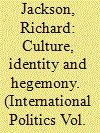

|
|
|
|
|
| Publication |
2011.
|
| Summary/Abstract |
This article explores the social and political construction of US counterterrorism policy since the onset of the war on terrorism. The first part of the article focuses on the period of the Bush administration. It explores the cultural grammar expressed in the language of the war on terror, as well as administration attempts to 'sell' the policy to the American public. In addition, it explores the ways in which the war on terror has been institutionalised in counterterrorism practices and institutions, and how it has been normalised and embedded in American popular culture and linked by the national identity narratives surrounding '9/11' and the negative ideograph of 'terrorism', to American identity. Section two of the article explores the discourse and practice of the war on terrorism in the initial period of the Obama administration. It questions the extent to which counterterrorism policy can be rewritten, given the degree to which it accords with the deep cultural grammar of American identity and is now a well-established ideograph, the extent to which it has been institutionalised in American political practice and embedded in American culture and the ways in which it is rooted in the political-economic interests of the American polity and empire. Finally, the article briefly reflects on questions of change and identity in the construction of US foreign policy.
|
|
|
|
|
|
|
|
|
|
|
|
|
|
|
|
| 6 |
ID:
105356
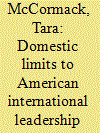

|
|
|
|
|
| Publication |
2011.
|
| Summary/Abstract |
In this article it is argued that there is a striking absence from contemporary academic (and policy) discussions about American international leadership, and that is the domestic dimension to international leadership. Most current discussion focuses upon the actions of the Bush administration in the international sphere, which is argued to have eroded legitimate American leadership. It is hoped that Obama can reinvigorate American leadership through his actions in the international sphere. Here, however, it is argued that legitimate American leadership during the Cold War was based firstly upon a specific domestic political context in Europe. This specific domestic political context has steadily changed since the late 1960s, eroding legitimate American international leadership. In the absence of this domestic context, America will not be able to reassert legitimate leadership. International legitimacy, like charity, must begin at home in the domestic political sphere.
|
|
|
|
|
|
|
|
|
|
|
|
|
|
|
|
| 7 |
ID:
105361
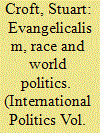

|
|
|
|
|
| Publication |
2011.
|
| Summary/Abstract |
American identities have traditionally been bound up with racial and religious markers - the WASP marker being for many, many decades and that which described the fullest state of American-ness. In the age of an African-American President, such conventional wisdoms are clearly challenged; and yet race and religion still describe different degrees of American-ness. This article investigates these identity themes not through the traditional duologue of white and African American, but seeks to understand in different communities how race and religion combine to produce different American-ness. Through an examination of two communities deemed problematic because of the high percentage of unchurched among them - First Peoples and Asian Americans - the article describes different processes at work. First Peoples are often seen in racial rather than national terms. The work of evangelicals 'among' such peoples is assessed within the United States and beyond. In contrast, Asian-American identities are often articulated through evangelism, particularly on the campuses of the United States. Together, these case studies show that American-ness is being redefined, to include new racial categories and groups newly empowered by their religious activity. This connects to issues of migration; evangelism is now active in America as well as beyond, as the world comes to live in the United States, traditional boundaries - inside/outside and white/African American - carry different and often less weight than hitherto has been the case.
|
|
|
|
|
|
|
|
|
|
|
|
|
|
|
|
| 8 |
ID:
105355
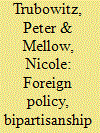

|
|
|
|
|
| Publication |
2011.
|
| Summary/Abstract |
The attacks of September 11 and the resulting war on terrorism present a puzzle to conventional explanations of foreign policy bipartisanship. Public anxiety about the international environment increased sharply after the attacks in 2001, but this did not translate into greater foreign policy consensus despite the initial predictions of many analysts. In this article, we advance a theory of foreign policy bipartisanship that emphasizes its domestic underpinnings to explain the absence of consensus in Washington. We argue that bipartisanship over foreign policy depends as much on domestic economic and electoral conditions as on the international security environment. Using multivariate analysis of roll call voting in the House of Representatives from 1889 to 2008, we show that bipartisanship over foreign policy is most likely not only when the country faces a foreign threat but also when the national economy is strong and when party coalitions are regionally diverse. This was the case during the Cold War. Despite concern about terrorism in recent years, economic volatility and regional polarization have made bipartisan cooperation over foreign policy elusive.
|
|
|
|
|
|
|
|
|
|
|
|
|
|
|
|
| 9 |
ID:
105358
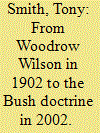

|
|
|
|
|
| Publication |
2011.
|
| Summary/Abstract |
The secular notion of American exceptionalism divorced from explicit racial or religious expression and based on governmental institutions and civic virtue - America as 'the last, best hope of earth' (Lincoln), America as 'the ark of the liberties of the world' (Melville) - goes back to the American Revolution. Nevertheless, before Wilson the conceptual framework that could explain the rightness of American global expansion in terms of bringing democratic government to others had not been well formulated. With Wilson, by contrast, the United States for the first time could present in secular terms, concepts argued from a cultural and historical perspective that made the expansion of American influence around the globe legitimate, not only in terms of national security but to the benefit of all mankind. Here is the key, I would propose, to the self-confidence and self-righteousness, which has been the hallmark of American foreign policy for a century now. Democracy promotion (associated with open markets economically and multilateralism) reflected America's cultural superiority (inherited from racial thinking), as well as its mission to help others (descended from its religious background). In Wilson's hands, an enduring framework for American foreign policy was born, one that remains with us to this day.
|
|
|
|
|
|
|
|
|
|
|
|
|
|
|
|
| 10 |
ID:
105360
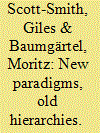

|
|
|
|
|
| Publication |
2011.
|
| Summary/Abstract |
As Obama took office at the beginning of 2009, several new figures attained important advisory positions in his administration. Anne-Marie Slaughter, former Dean of the Woodrow Wilson School at Princeton University, and now Director of Policy Planning in the State Department, is a prime example of the 'change' that has come to Washington. In recent years she has been part of a growing academic circle that views networks at the centre of international relations. At the same time, she has promoted the idea that the United States can be 'the most connected country' in such a world. By taking a closer look into the discourse of US supremacy and the current state-of-the-art in the theory of transnational networks, this article reveals the divergence between wishful thinking and reality in Slaughter's position. By analysing her position and introducing three case studies, we conclude that the complexity of power relations in a world of networks makes any assumption of US supremacy highly problematic. Some might 'mirror' the beliefs and values of America (Open Society Institute); some might only be a 'prism' of various different voices (Al-Jazeera); and some might fall totally outside state control to form 'shadow networks' (Khan Network). Ultimately, it is the belief in US exceptionalism that perpetuates the claim that the United States has 'an edge' in such a world, with potentially problematic consequences.
|
|
|
|
|
|
|
|
|
|
|
|
|
|
|
|
| 11 |
ID:
105357
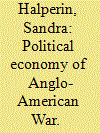

|
|
|
|
|
| Publication |
2011.
|
| Summary/Abstract |
This article relates the Anglo-American invasion of Iraq to fundamental aspects of Anglo-American political economy, including the increasing integration of the British and US economies, and the largely Anglo-American-led project of global economic restructuring currently taking place. Part I discusses the political economy of UK-US relations and the evolution of an Anglo-American military-industrial conglomerate. Part II links the Anglo-American relations and interests detailed in the first part of the article to an on-going project of global reconstruction. With this as a context, Part III reviews the history of British and US foreign policies towards Iraq and the culmination of these policies in the invasion of the country. The conclusions draw implications for the overall nature and direction of current trends of change.
|
|
|
|
|
|
|
|
|
|
|
|
|
|
|
|
| 12 |
ID:
105365
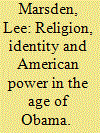

|
|
|
|
|
| Publication |
2011.
|
| Summary/Abstract |
US foreign policy owes much to a malleable religious identity, shaped by foundational myths, and that this religious dimension has, until recently, been largely neglected in the US foreign policy literature to the detriment of our understanding of how America's status as global hegemon is formed, sustained and expanded. This article explores the role of the foundational myths of manifest destiny, exceptionalism and innocent nation. These foundational myths are explored as they develop into a civil religion espoused by successive presidents from George Washington to the present day. The article considers how Barack Obama has utilised civil religion to maximise domestic support for a foreign policy agenda, which seeks to maintain US hegemony through a more conciliatory and multilateral approach than his predecessor in the White House. Examples of the use of soft power through missionary endeavour and the evangelicalisation of military hard power beginning during the George W. Bush presidency are detailed in order to reveal an Obama presidency that continues to define itself in religious terms while providing opportunities for religious actors to continue to play a role in representing US interests beyond its shores.
|
|
|
|
|
|
|
|
|
|
|
|
|
|
|
|
| 13 |
ID:
105368
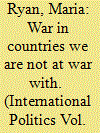

|
|
|
|
|
| Publication |
2011.
|
| Summary/Abstract |
This article examines the origins of the 'Global War on Terror' (GWoT) in peripheral locations; in other words, in countries and regions beyond Iraq and beyond Afghanistan. Although those two countries have remained the 'core' regions of the GWoT, the Bush administration also undertook many other military interventions in countries and regions in ostensibly peripheral locations under the auspices of the 'war on terror'; operations which it referred to in its 2006 Quadrennial Defense Review as 'war in countries we are not at war with'. These include operations in the Horn of Africa, Georgia and the Caspian region, the Philippines and the countries across the Sahara region including Mali, Niger, Chad and Mauritania. This article examines these peripheral theatres in the GWoT and argues that, by its second term, the Bush administration had moved beyond a state-based worldview vis-à-vis terrorism and had truly come to understand it as a transnational problem; a protean network that should be tackled through using Special Operations Forces and unconventional warfare to wage 'war in countries we are not at war with'. The article also considers the extent to which these operations on the 'periphery' were expedient in other ways that often transcended the war on terror because they coincided with the existence of long-standing or newly identified US strategic interests. Finally, the article considers the Obama administration's continuation - and in some cases escalation - of many of the Bush administration's operations in peripheral regions, even as Obama looks to wind down the war in Iraq.
|
|
|
|
|
|
|
|
|
|
|
|
|
|
|
|
| 14 |
ID:
105359
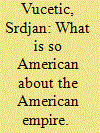

|
|
|
|
|
| Publication |
2011.
|
| Summary/Abstract |
This article argues that the American empire cannot be fully understood without reference to the ways in which American imperial identities have been associated with the historical experience of England/Britain. To make this argument, the article considers four discourses of identity in particular - Anglo-Protestantism (religion), Anglo-Saxonism (ethnicity/race), Anglo-Saxon capitalism (institutions) and English (language). US imperial development was conditioned by many forces, but none match the aggregate power of America's 'Anglo-ness'. Although it is too early to assess the ways in which these discourses are negotiated, critiqued and reproduced in the 'age of Obama', the American empire is likely to continue to protect and project Anglo-ness vis-à-vis to the rest of the world.
|
|
|
|
|
|
|
|
|
|
|
|
|
|
|
|
|
|
|
|
|